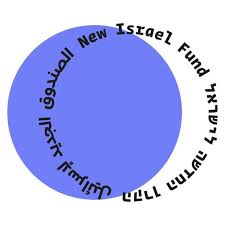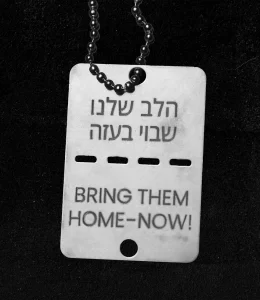I Have a Voice by Elana Arian is a message we need to embrace, particularly in these turbulent times.
Let’s listen to the next generation and the belief in their power.
Shabbat Shalom
#BringThemHomeNow
I Have a Voice by Elana Arian is a message we need to embrace, particularly in these turbulent times.
Let’s listen to the next generation and the belief in their power.
Shabbat Shalom
#BringThemHomeNow
I had the honor of moderating a conversation for the New Israel Fund (NIF) at Beth Am Israel, located on the Main Line in suburban Philadelphia.
 Our speakers, Rabbi Noa Sattath and Libby Linkenski are dedicated to fostering a shared society that upholds our Jewish values. Our values endure, even in challenging times like these, when they are stressed and tested as rarely before in our history. Indeed, our values are more important than ever for maintaining perspective. Libby shared three points to remember as we navigate these difficult times:
Our speakers, Rabbi Noa Sattath and Libby Linkenski are dedicated to fostering a shared society that upholds our Jewish values. Our values endure, even in challenging times like these, when they are stressed and tested as rarely before in our history. Indeed, our values are more important than ever for maintaining perspective. Libby shared three points to remember as we navigate these difficult times:
Palestinians are not Hamas. Israelis are not Benjamin Netanyahu. Americans are not Donald Trump. We are more than the actions of our extremist leaders and are not directly complicit in their worst acts.
The conflict didn’t begin on October 7, and October 7 itself was indefensible. So is the ongoing assault on the people of Gaza. We can’t lose our moral clarity, regardless of politics.
Two peoples have always existed between the river and the sea, and both will continue to exist. Any vision that erases one side is a vision of unimaginable violence. The question is not whether we coexist but how. That’s where the conversation begins—and where it must end.
We must continue working to lay the foundation for a future where both people can live with dignity and security.
The Shvesters bring their talents to ‘Eli, Eli’ Hannah Szenes’ poem written in 1942.
As we, too, struggle with the pain of war, we reach out in prayer, hoping for peace and an end to the suffering. May it come soon.
Shabbat Shalom
#BringThemHomeNow
Nissim Black delivers his rap Zman Cheruteinu for us to get ready for the message of Passover.
Enjoy and Chag Pesach Sameach!
#BringThemHomeNow
Naomi Shemer penned this anthem, expressing our longing for the sacredness of Jerusalem. Rabbi Angela Buchdal and Cantor Dan Mutlu share their extraordinary voices to sing Yerushalim Shel Zahav.
May the sacredness and promise of Jerusalem live, peace come to the region, and our hostages are returned home.
Shabbat Shalom
The Prayer, is a duet shared by Cantors Azi Schwartz and Mira Davis. I hope it helps you to enter Shabbat comforted by divinely inspired music and lyrics.
Shabbat Shalom
Let us pray for the hostages scheduled to be returned tomorrow and that those remaining in captivity will come home soon.
#BringThemHome
We offer Eshet Chayil verses from the Book of Proverbs at the Shabbat Table. We are grateful for the “woman of valor,” the specialness of our life partner.
The Shvesters bring these verses to life in a beautiful song.
Shabbat Shalom
#BringThemHome
 One of the horrors of the current war is the holding of the hostages. Their predicament is hopeless because their freedom depends on some level of trust, and there is no trust.
One of the horrors of the current war is the holding of the hostages. Their predicament is hopeless because their freedom depends on some level of trust, and there is no trust.
Israel and Hamas are avowed enemies. Each is dedicated to the destruction of the other. There is no middle ground, no reconciliation, no peace. With this at each core, trust cannot exist.
Hamas has fully embraced the “civilian as a weapon” idea. To give up the hostages means giving up one of its most potent weapons. The hostages have been used as shields, and many believed as a bargaining chip. But without trust, there is no incentive to use this bargaining chip, and once it is used, nothing is left. Hamas does not trust that Israel will live by an agreement; they believe Israel sees an agreement as only the means to obtaining the release of the hostages, nothing more. Once the hostages are returned, Israel will continue to prosecute the war.
Israel has displayed its commitment to destroying Hamas. As Hamas cannot be appeased, it must be eliminated. Israel has a long memory and believes in retribution. It does not trust Hamas. Israel thought it could permit Hamas to exist as it did not pose an existential threat and accepted a tenuous ceasefire. Then, October 7 happened, and whatever trust existed was shattered.
A ceasefire is a lull until it ends, and the warring begins again. This is part of the cynical lack of trust, but it is one of the few things both sides can agree upon.
War is usually fought to capitulation. One side is defeated unequivocally. The victor then dictates the terms of surrender and peace over the vanquished. This may not be possible. But until these two warring parties have more to gain by ceasing hostilities and learning to co-exist, the death and destruction will continue.
I pray that the current negotiations might prove me wrong and that the hostages will be returned. And perhaps peace might be seen as an alternative to hatred and carnage.